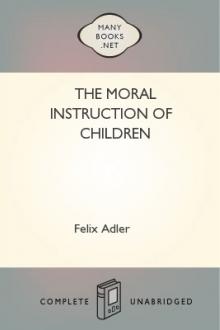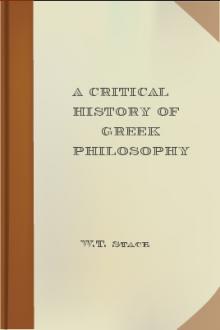Hegel's Philosophy of Mind by Georg Wilhelm Friedrich Hegel (novels to improve english .TXT) 📕

- Author: Georg Wilhelm Friedrich Hegel
- Performer: -
Book online «Hegel's Philosophy of Mind by Georg Wilhelm Friedrich Hegel (novels to improve english .TXT) 📕». Author Georg Wilhelm Friedrich Hegel
The “positive supersession107” of individualism and naturalism in ethics is by Hegel called “Absolute Ethics.” Under this title he describes the ethics and religion of the state—a religion which is immanent in the community, and an ethics which rises superior to particularity. The picture he draws is a romance fashioned upon the model of the Greek commonwealth as that had been idealised by Greek literature and by the longings of later ages for a freer life. It is but one of the many modes in which Helena—to quote Goethe—has fascinated the German Faust. He dreams himself away from the prosaic worldliness of a German municipality to the unfading splendour of the Greek city with its imagined coincidence of individual will with universal purpose. There is in such a commonwealth no pain of surrender and of sacrifice, and no subsequent compensation: for, at the very moment of resigning self-will to common aims, he enjoys it retained with the added zest of self-expansion. He is not so left to himself as to feel from beyond the restraint of a law which controls—even if it wisely and well controls—individual effort. There is for his happy circumstances no possibility of doing otherwise. Or, it may be, Hegel has reminiscences from the ideals of other nations than the Greek. He recalls the Israelite depicted by the Law-adoring [pg cxcv] psalmist, whose delight is to do the will of the Lord, whom the zeal of God's house has consumed, whose whole being runs on in one pellucid stream with the universal and eternal stream of divine commandment. Such a frame of spirit, where the empirical consciousness with all its soul and strength and mind identifies its mission into conformity with the absolute order, is the mood of absolute Ethics. It is what some have spoken of as the True life, as the Eternal life; in it, says Hegel, the individual exists auf ewige Weise108, as it were sub specie aeternitatis: his life is hid with his fellows in the common life of his people. His every act, and thought, and will, get their being and significance from a reality which is established in him as a permanent spirit. It is there that he, in the fuller sense, attains αὐτάρκεια, or finds himself no longer a mere part, but an ideal totality. This totality is realised under the particular form of a Nation (Volk), which in the visible sphere represents (or rather is, as a particular) the absolute and infinite. Such a unity is neither the mere sum of isolated individuals, nor a mere majority ruling by numbers: but the fraternal and organic commonwealth which brings all classes and all rights from their particularistic independence into an ideal identity and indifference109. Here all are not merely equal before the laws: but the law itself is a living and organic unity, self-correcting, subordinating and organising, and no longer merely defining individual privileges and so-called liberties. “In such conjunction of the universal with the particularity lies the divinity of a nation: or, if we give this universal a separate place in our ideas, [pg cxcvi] it is the God of the nation.” But in this complete accordance between concept and intuition, between visible and invisible, where symbol and significate are one, religion and ethics are indistinguishable. It is the old conception (and in its highest sense) of Theocracy110. God is the national head and the national life: and in him all individuals have their “difference” rendered “indifferent.” “Such an ethical life is absolute truth, for untruth is only in the fixture of a single mode: but in the everlasting being of the nation all singleness is superseded. It is absolute culture; for in the eternal is the real and empirical annihilation and prescription of all limited modality. It is absolute disinterestedness: for in the eternal there is nothing private and personal. It, and each of its movements, is the highest beauty: for beauty is but the eternal made actual and given concrete shape. It is without pain, and blessed: for in it all difference and all pain is superseded. It is the divine, absolute, real, existing and being, under no veil; nor need one first raise it up into the ideality of divinity, and extract it from the appearance and empirical intuition; but it is, and immediately, absolute intuition111.”
If we compare this language with the statement of the Encyclopaedia we can see how for the moment Hegel's eye is engrossed with the glory of the ideal nation. In it, the moral life embraces and is co-extensive with religion, art and science: practice and theory are at one: life in the idea knows none of those differences which, in the un-ideal world, make art and morality often antithetical, and set religion at variance with science. It is, as we have said, a memory of Greek and perhaps Hebrew ideals. Or rather it is by the help of such [pg cxcvii] memories the affirmation of the essential unity of life—the true, complete, many-sided life—which is the presupposition and idea that culture and morals rest upon and from which they get their supreme sanction, i.e. their constitutive principle and unity. Even in the Encyclopaedia112 Hegel endeavours to guard against the severance of morality and art and philosophy which may be rashly inferred in consequence of his serial order of treatment. “Religion,” he remarks, “is the very substance of the moral life itself and of the state.... The ethical life is the divine spirit indwelling in consciousness, as it is actually present in a nation and its individual members.” Yet, as we see, there is a distinction. The process of history carries out a judgment on nation after nation, and reveals the divine as not only immanent in the ethical life but as ever expanding the limited national spirit till it become a spirit of universal humanity. Still—and this is perhaps for each time always the more important—the national unity—not indeed as a multitude, nor as a majority—is the supreme real appearance of the Eternal and Absolute.
Having thus described the nation as an organic totality, he goes on to point out that the political constitution shows this character by forming a triplicity of political orders. In one of these there is but a silent, practical identity, in faith and trust, with the totality: in the second there is a thorough disruption of interest into particularity: and in the third, there is a living and intellectual identity or indifference, which combines the widest range of individual development with the completest unity of political loyalty. This last order is that which lives in conscious identification of private with public duty: all that it does has a universal and public function. Such a body is the ideal Nobility—the [pg cxcviii] nobility which is the servus servorum Dei, the supreme servant of humanity. Its function is to maintain general interests, to give the other orders (peasantry and industrials) security,—receiving in return from these others the means of subsistence. Noblesse oblige gives the death-blow to particular interests, and imposes the duty of exhibiting, in the clearest form, the supreme reality of absolute morality, and of being to the rest an unperturbed ideal of aesthetic, ethical, religious, and philosophical completeness.
It is here alone, in this estate which is absolutely disinterested, that the virtues appear in their true light. To the ordinary moralising standpoint they seem severally to be, in their separation, charged with independent value. But from the higher point of view the existence, and still more the accentuation of single virtues, is a mark of incompleteness. Even quality, it has been said, involves its defects: it can only shine by eclipsing or reflecting something else. The completely moral is not the sum of the several virtues, but the reduction of them to indifference. It is thus that when Plato tries to get at the unity of virtue, their aspect of difference tends to be subordinated. “The movement of absolute morality runs through all the virtues, but settles fixedly in none.” It is more than love to fatherland, and nation, and laws:—that still implies a relation to something and involves a difference. For love—the mortal passion, where “self is not annulled”—is the process of approximation, while unity is not yet attained, but wished and aimed at: and when it is complete—and become “such love as spirits know113”—it gives place to a calmer rest and an active immanence. The absolute morality is life in the fatherland and for the nation. In the individual however it is the process upward and inward [pg cxcix] that we see, not the consummation. Then the identity appears as an ideal, as a tendency not yet accomplished to its end, a possibility not yet made fully actual. At bottom—in the divine substance in which the individual inheres—the identity is present: but in the appearance, we have only the passage from possible to actual, a passage which has the aspect of a struggle. Hence the moral act appears as a virtue, with merit or desert. It is accordingly the very characteristic of virtue to signalise its own incompleteness: it emerges into actuality only through antagonism, and with a taint of imperfection clinging to it. Thus, in the field of absolute morality, if the virtues appear, it is only in their transiency. If they were undisputedly real in morality, they would not separately show. To feel that you have done well implies that you have not done wholly well: self-gratulation in meritorious deed is the re-action from the shudder at feeling that the self was not wholly good.
The essential unity of virtue—its negative character as regards all the empirical variety of virtues—is seen in the excellences required by the needs of war. These military requirements demonstrate the mere relativity and therefore non-virtuousness of the special virtues. They equally protest against the common beliefs in the supreme dignity of labour and its utilities. But if bravery or soldierlike virtue be essentially a virtue of virtues, it is only a negative virtue after all. It is the blast of the universal sweeping away all the habitations and fixed structures of particularist life. If it is a unity of virtue, it is only a negative unity—an indifference. If it avoid the parcelling of virtue into a number of imperfect and sometimes contradictory parts, it does so only to present a bare negation. The soldier, therefore, if in potentiality the unity of all the virtues, may [pg cc] tend in practice to represent the ability to do without any of them114.
The home of these “relative” virtues—of morality in the ordinary sense—is the life of the second order in the commonwealth: the order of industry and commerce. In this sphere the idea of the universal is gradually lost to view: it becomes, says Hegel, only a thought or a creature of the mind, which does not affect practice. The materialistic worker of civilisation does not see further than the





Comments (0)